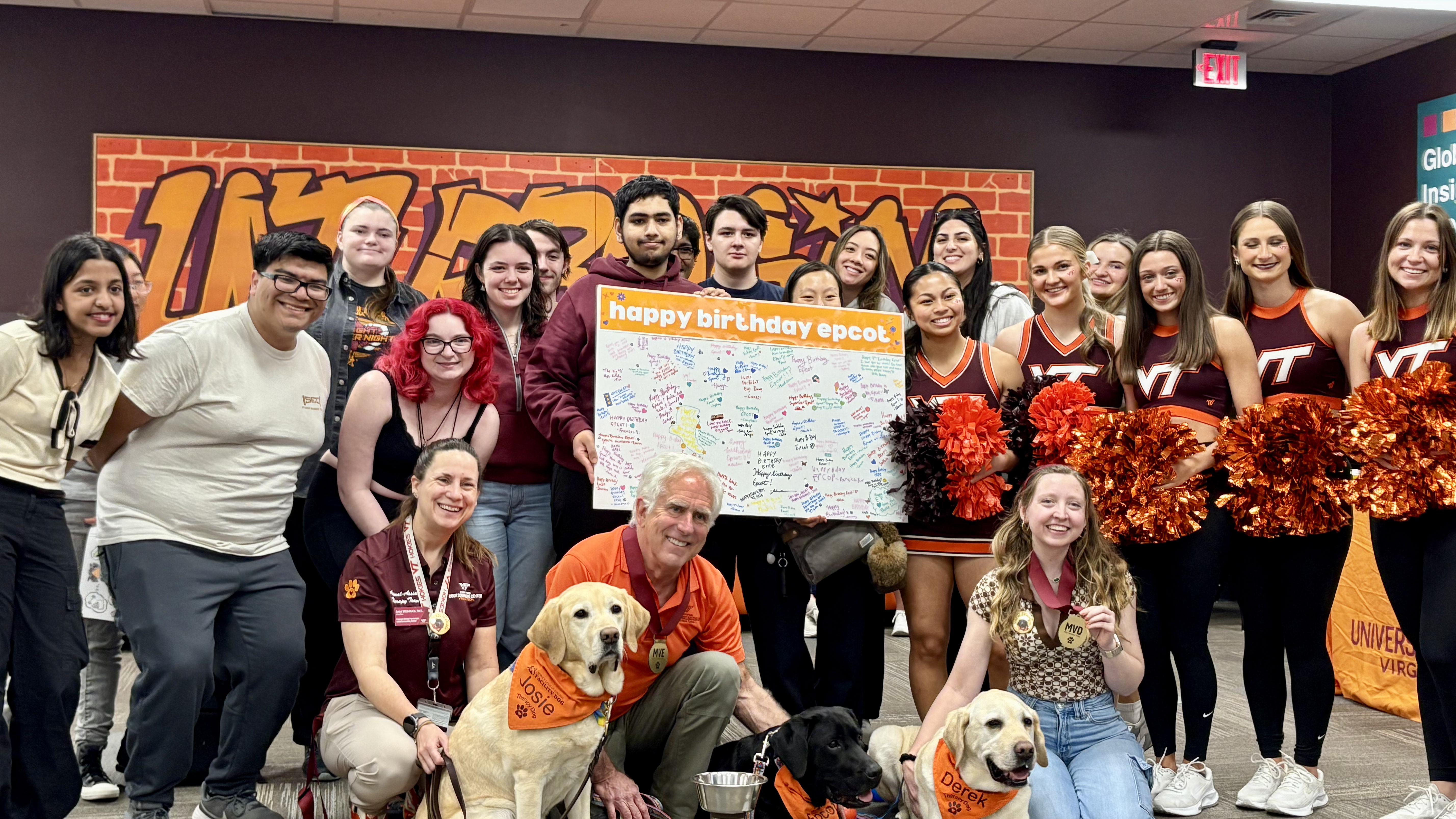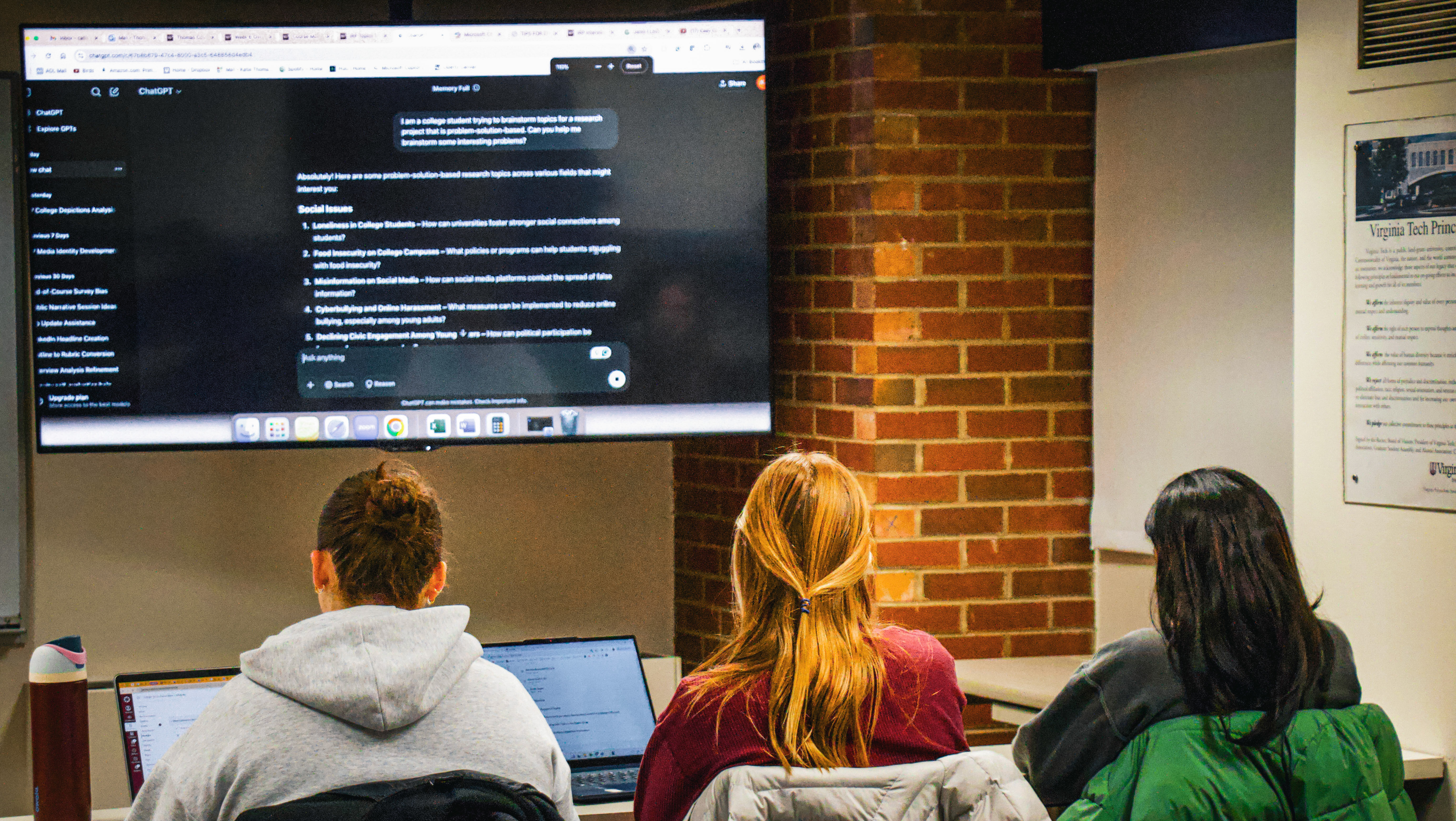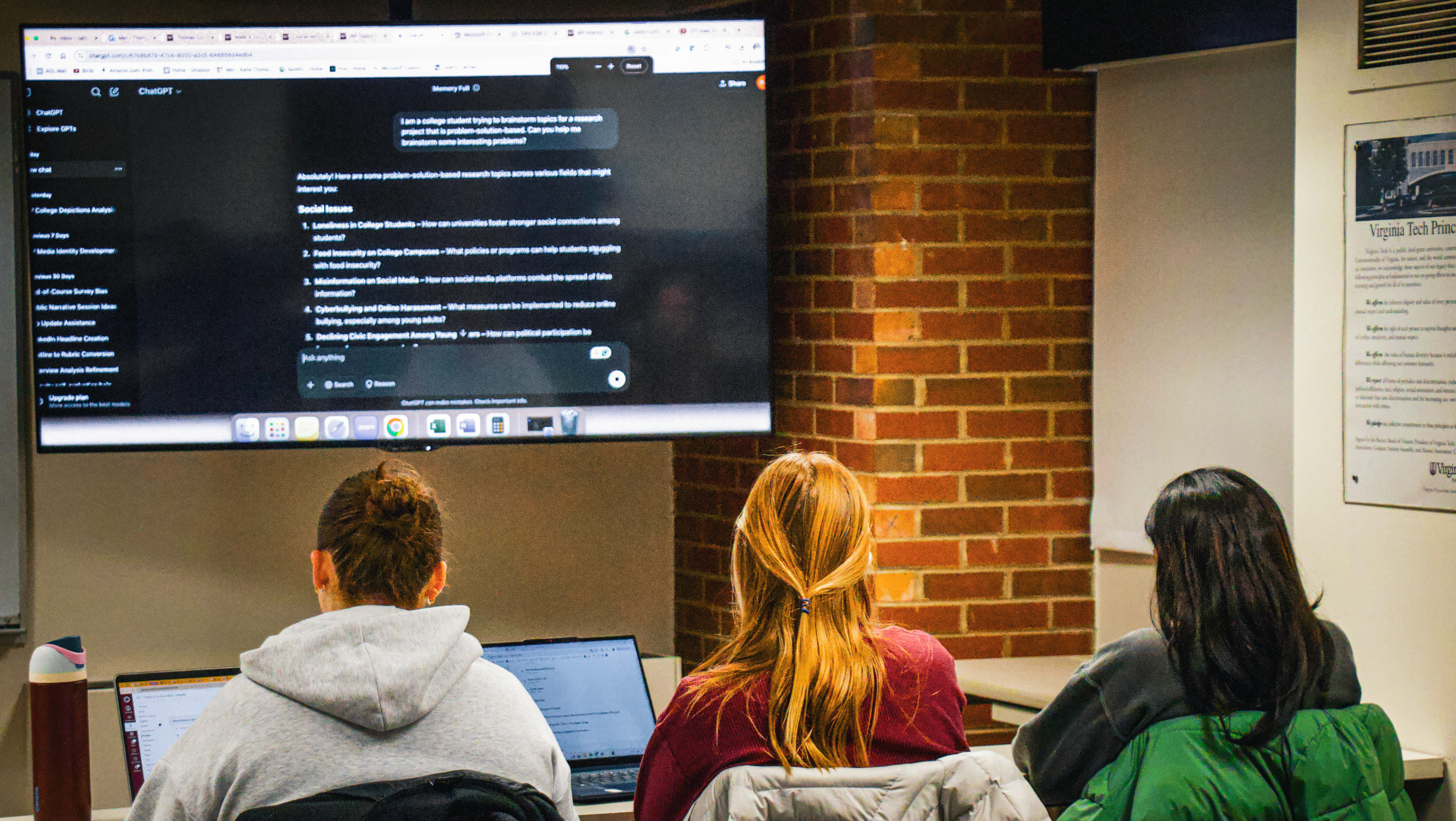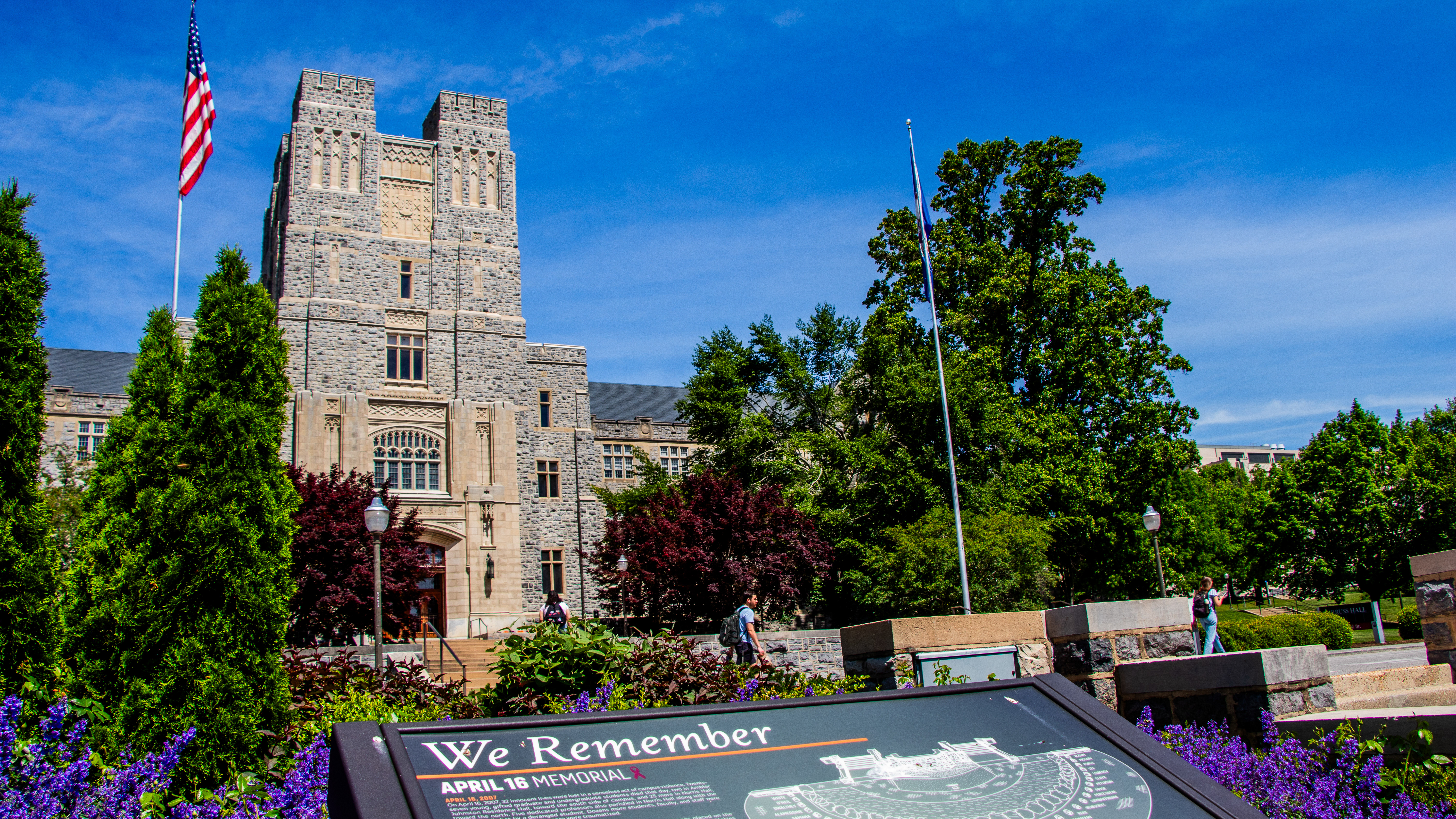Peter vs. the skyline: One baker’s bid to shape Blacksburg’s future
A new housing development on North Main is dividing Blacksburg. Mayor Hager-Smith sees it as progress. Peter Macedo calls it a threat to his livelihood. Blacksburg is caught in the middle.
Michaela Scott
April 14, 2025
Blacksburg, Virginia, April 14, 2025 — Drive Down Main: The corner of Main Street and Alumni Mall sits at a high point on the Eastern Continental Divide, offering a prime vantage of downtown. In contrast, the new eight-story housing development will rise at a lower point on the Divide, softening its towering presence.
At 2 a.m., while students cram for tests and the town sleeps, Peter Macedo will begin his day shaping dough at his bakery. Recently, he was blindsided when a new development would soon threaten everything that he built.
Macedo co-founded Blacksburg Bagels in 2013. The business is in a small, tucked-in strip off Kabrich Street and near the intersection of Prices Fork Road and North Main Street. It’s the kind of place that a person would only find if they were looking for it.
Though the area is quiet, Macedo lives for the rhythm that begins his days. He can hear Stroubles Creek trickling past his establishment, metal trays clinking throughout the kitchen and birds chirping from the trees.
“My goal is always to make the type of bread that you would want to have at home if you had the time to do it yourself,” Macedo said. “And providing that for restaurants in the area is a big partnership for us too.”
Across the street from Macedo’s shop is a triangle-shaped patch of land with a series of buildings that were once prosperous businesses. Nowadays, the strip appears vacant and is used as a storage space, temporary parking lot for a local mechanic and ramshackle, abandoned Pizza Hut.
Macedo shared that he spends time sitting out front on his bench and pondering what businesses could move into the area to promote economic development on the block.
In October 2024, Macedo realized his routine was about to change. As he sat on his bench after he finished the daily batches of bread, Macedo noticed a sign posted in front of one of the storage garages. It was a zoning notice which evoked a sense of confusion, disappointment and disbelief in him. He noted that he regularly communicates with every town council member, yet this was the first time that he was made aware of a massive apartment complex proposal.
“When I saw the size of it, I was like, this has got to be a joke,” Macedo said. “It’s going to be the largest thing in town. It’s not as tall as Slusher Tower, but it definitely will have a bigger footprint than Slusher.”
The sign revealed a plan for a towering, eight-story student housing complex with structured parking, designed by a private developer, LV Collective. A WDBJ7 article reported that the building is designed to house nearly 800 students. Despite Macedo’s discontent, the Blacksburg Town Council doesn’t see development as an opportunity, but a necessity.
As Virginia Tech continues to grow, with over 38,000 students enrolled as of fall 2024, Blacksburg is faced with a skyrocketing housing shortage. Tensions began heightening between town residents and the university in 2014 when Timothy Sands became the university’s president. He emphasized initiatives to expand and position Virginia Tech as a leading global, land-grant institution.
In 2019, as a way to match the university’s rate of change, the Blacksburg Town Council created a comprehensive plan that addresses innovation and calls for immediate action on the housing shortage. The plan is called the North Main Street Strategy for Redevelopment and it was adopted to manage growth while preserving the town’s character.
With vacant businesses that line the area and a town that is ranked No. 1 nationally for low-vacancy housing, the site near Blacksburg Bagels seemed ideal for redevelopment, noted Leslie Hager-Smith, mayor of Blacksburg.
“I think there’s a lot of people who are grieving the rate of change in Blacksburg, and I actually share their unhappiness,” Hager-Smith said. “I can be unhappy about the situation before us, but it doesn’t relieve me of responsibility for making the best, most unselfish choices that I can make for the community.”
Despite its potential, the location has a major natural obstacle that must be overcome. Blacksburg is situated on the Eastern Continental Divide and the area of the development rises at a lower point on the geographical feature which helps to soften its massive presence. However, it’s still prone to stormwater runoff and floods. This is especially apparent as Stroubles Creek runs directly through the strip. As a result, town officials stated that any developer who seeks to build on the property must resolve a multi-million-dollar infrastructure issue.
“The reason I supported it is because it wouldn’t matter whether you put a single-family house on that spot, a doghouse or a whorehouse,” Hager-Smith said. “It starts with a $3 million stormwater problem.”
In addition to the floodplain improvements, LV Collective also promised to contribute $1.1 million toward the town’s affordable housing fund. The fund aims to increase housing options for low and moderate-income households and Hager-Smith noted that the town needs that support right now.
“[LV Collective] worked with our stormwater engineers to make sure it will be a safe and sustainable building,” said Susan Mattingly, Blacksburg town councilmember. “It went through plan review, then our staff spent a lot of time scrutinizing it, then it was approved by the planning commission. Then it comes to town council.”
In a 4-3 vote on Tuesday, March 11, the eight-story project was approved by the town council. While the reasons to redevelop the area looked great on paper to officials, Macedo was left to wonder if his opinion even mattered.
“I hate that visual thing that it’s going to be out front of Blacksburg Bagels because with the height of it, I don’t know if I’ll even be able to tell when the sun comes up,” Macedo said. “It’s a great design, but it’s the wrong location.”
Macedo raised concerns about rent increases and long-term access issues during construction. He explained that he doesn’t own the property where his business operates which makes it easy for the next set of developers to buy out his land because they can offer any price. Parking is another major concern because his lot is already limited to customers. Macedo said that once 800 students move into the development, tow trucks will likely become a regular presence on Kabrich Street.
“Maybe there’s a way they can do this without ever blocking the entrance to Blacksburg Bagels, but I have no idea how,” Macedo said. “I may lose utilities. I could lose power and water with construction too. We operate every single day and bake for other restaurants in town, so that would mean that I may lose my contracts.”
Macedo, along with a plethora of other town residents voiced their issues about the project during a public hearing. Council members acknowledged the individuals’ restlessness, but cited a consequentialist approach, prioritizing long-term benefits for the community, even if it unfavorably affects a few individuals.
“Maybe Peter’s rent will go up one day, but that’s not the basis on which I can make a decision,” Hager-Smith said. “I believe him and I feel concerned when somebody is vulnerable to me or expresses fear. However, we cannot let one guy’s anxiety feed what might be good for thousands of other people.”
Macedo also pushed back on the notion that the project would automatically benefit his business, like several council members tried to suggest. They argued that LV Collective’s offer to buy his bagels at a wholesale will allow him to sell thousands more bagels. However, Macedo didn’t see this perspective.
With the physical size of his shop, the limited capacity in his kitchen and the fixed amount of storage space for ingredients, Macedo said that he is certain that he won’t be able to meet that demand.
Through months of research and discussion with engineers and professors, Macedo inevitably became a point of contact for community members to find out information about the project.
“As I’m talking to all these people, they’re saying that I should run for town council,” Macedo said. “At first, I said to them that I don’t want to do that. I want to be a baker. I want to take care of my family and spend time with my partner and play with my dog outside. I want to keep doing the good things that I’m doing for this town, like supporting it with my bakery.”
However, with every new conversation from concerned neighbors, Macedo felt a shift that transformed his frustration into purpose. Macedo decided to run for town mayor.
“It’s not that I’m running for mayor solely because of this project, but it showed me that working with the community in this way is something that I really enjoy doing,” Macedo said. “It wasn’t just ‘not in my backyard’ energy from residents. It was really positive to see how the community was engaged to communicate to town council, to put together petitions and write letters to help Blacksburg keep its character.”
Mattingly acknowledged Macedo’s decision to run for mayor, while highlighting that he should be prepared to confront complex questions and bring solutions in a sustainable and environmentally responsible approach. Hager-Smith added that Macedo should also be ready to address the housing shortage without inconveniencing any business owners.
"Blacksburg will never be like it was when I got here in ‘93, but the town council has the capacity to decide what changes and more importantly what stays the same,” Macedo said. “I love this town, and I feel like the mayor needs to set the tone for cooperation and collaboration and supporting people when they’re doing good things and that is what I’ve always strived to do.”
In a community caught between growth and preservation, Macedo’s leadership is rooted in honest work, accountability and community care. As his campaign takes off, Macedo promises to listen first, act transparently and make decisions that focus on long-term sustainability over short-term convenience. Whether Macedo wins over voters or not, he hopes to remind them what is worth protecting in Blacksburg.
Multimedia Reporting (JMC 3154) at Virginia Tech prepares students to meet the demands of modern journalism by developing professional reporting strategies and digital storytelling skills. The course offers hands-on experience in news writing, audio and video production, and data visualization, using industry-standard tools to create compelling multimedia content. Students build a digital portfolio in Adobe Portfolio, showcasing traditional news articles, podcast-style audio stories, and interactive visuals. Tools like Adobe Audition are used to edit audio reports and interviews, while Adobe Illustrator helps transform raw data into clear, engaging infographics. Throughout the course, students are challenged to think critically about how different formats influence public understanding, with a strong emphasis on ethical reporting and audience engagement. Each project builds toward a cohesive, professional portfolio that reflects a deep understanding of multimedia journalism and digital communication.





